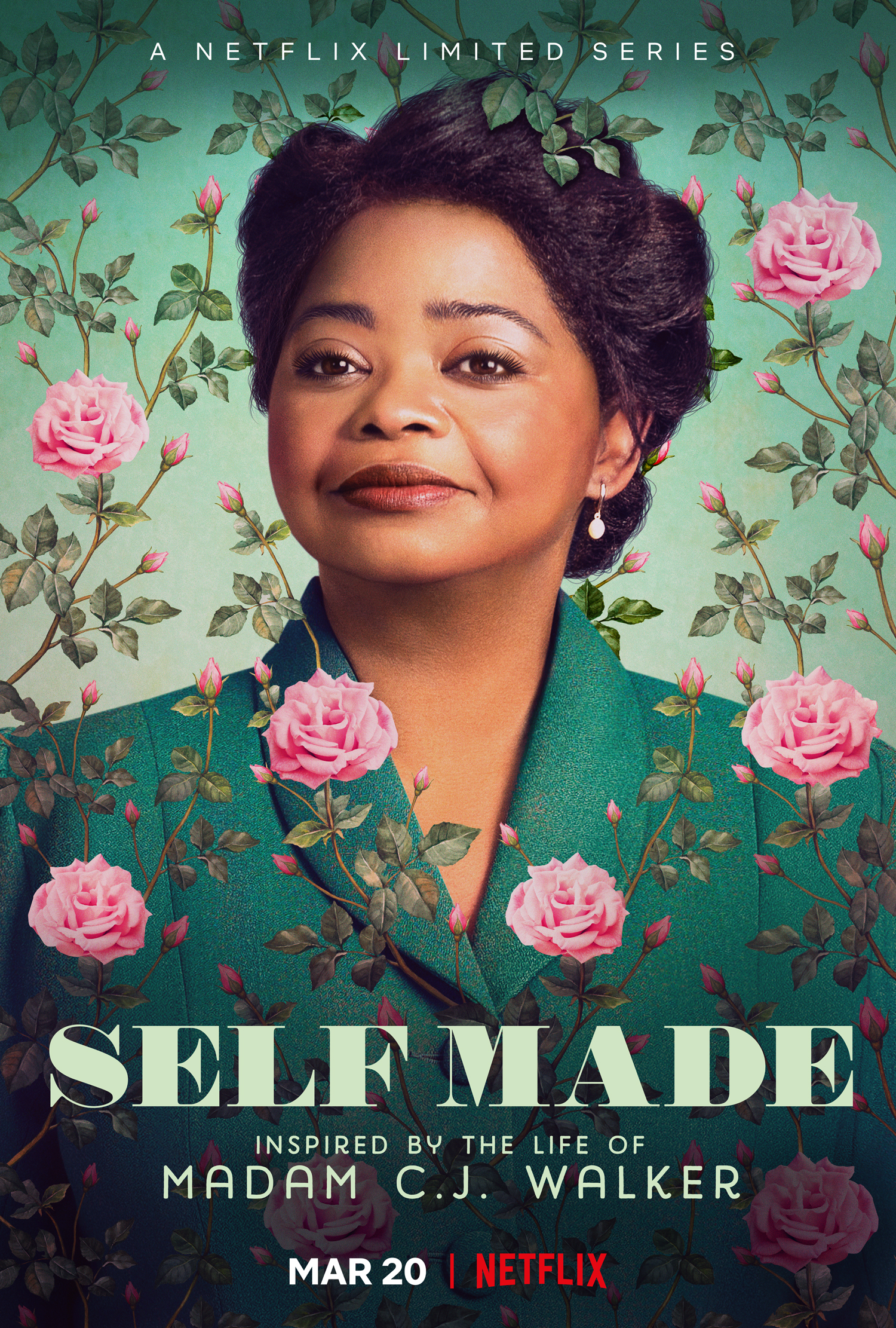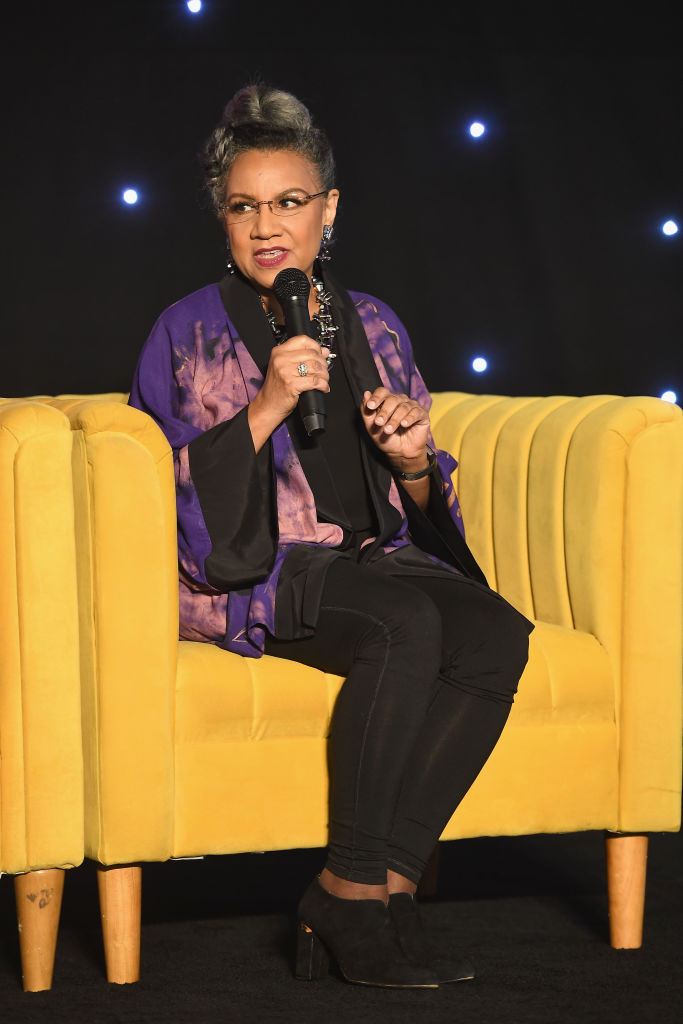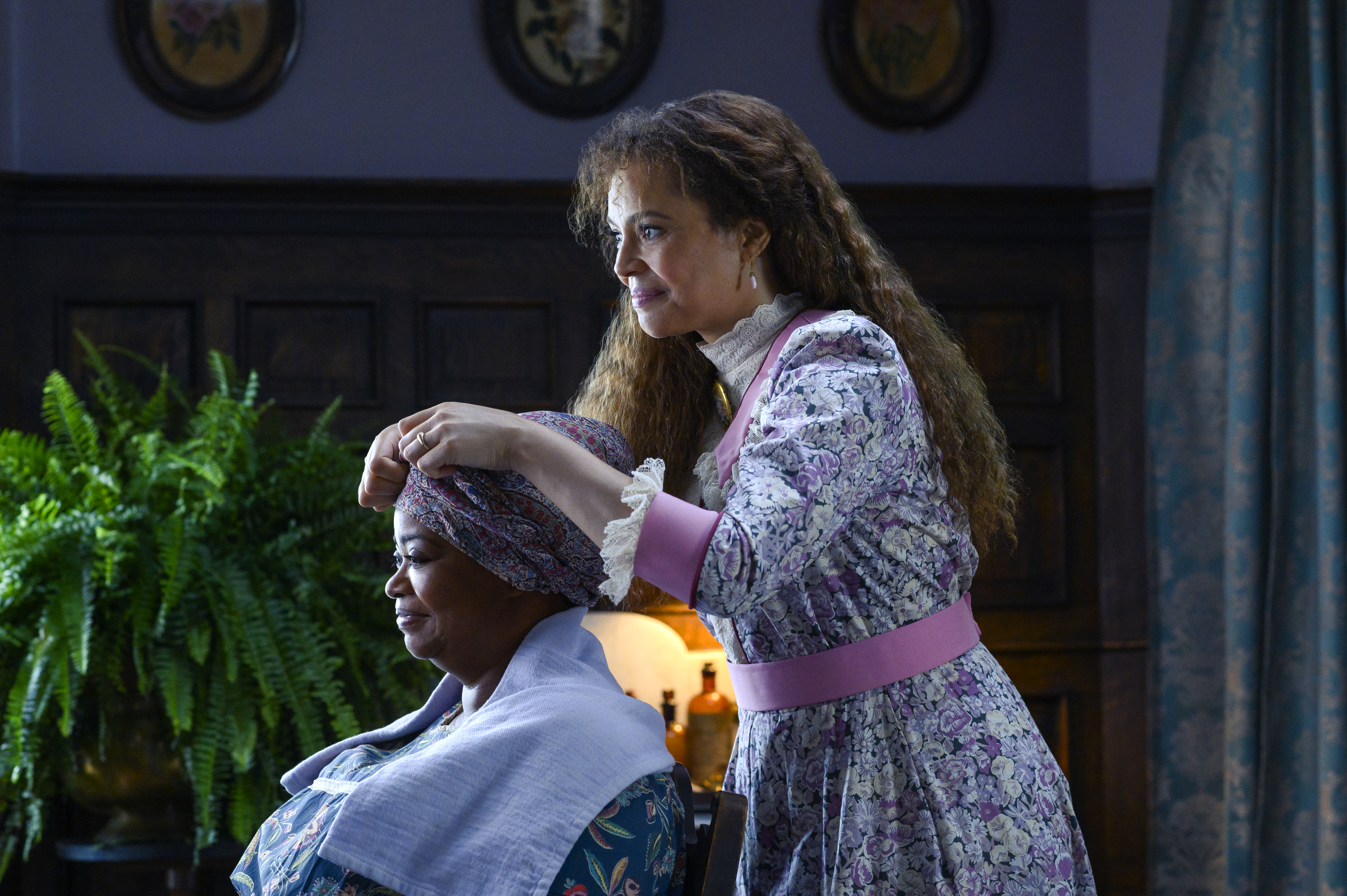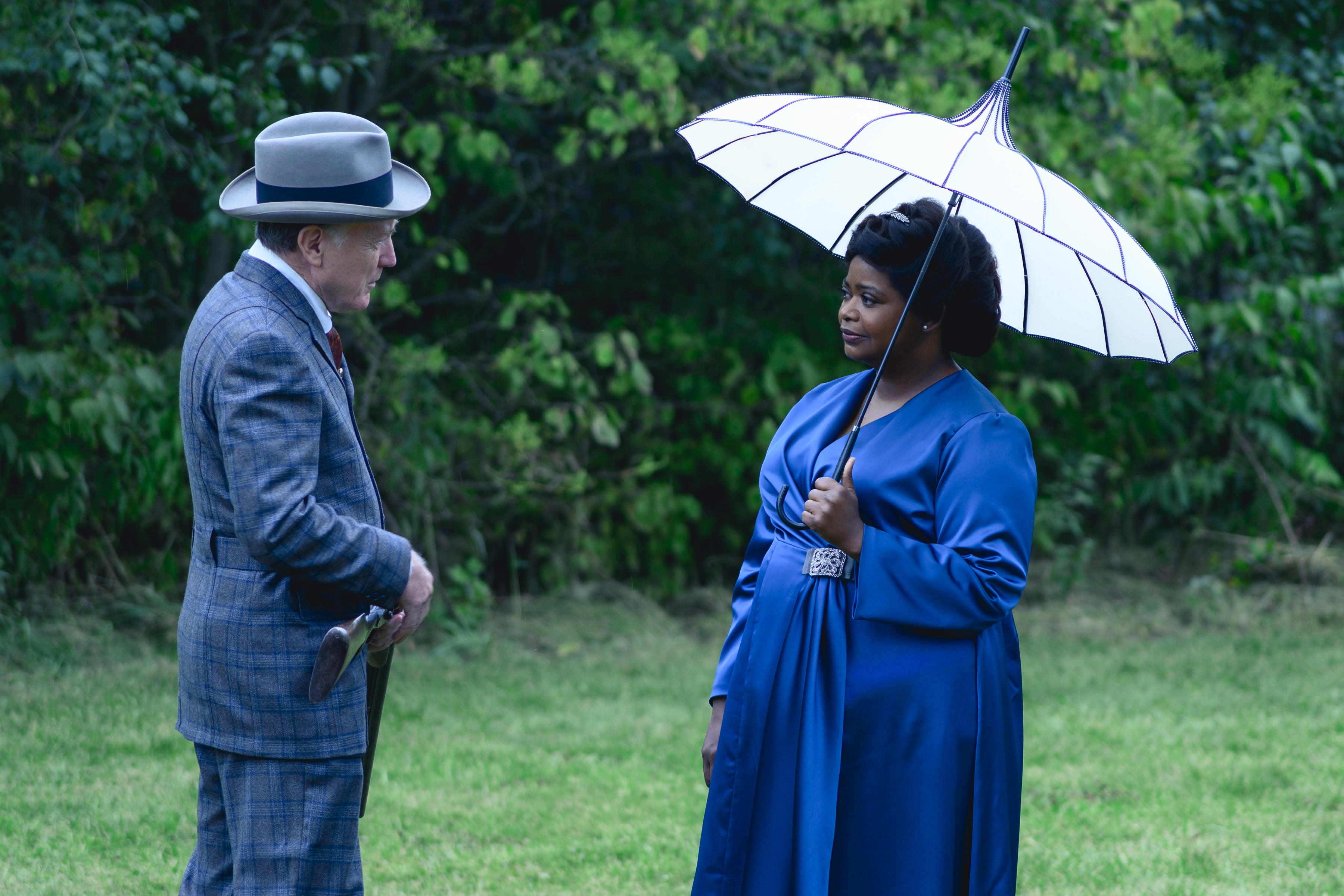
Source: Netflix / Netflix
If you’re anything like me, you watch films about historical figures and as the credits roll, you’re on your phone frantically researching to determine what was true of the story and what was fabricated for television.
I did the same thing after watching Self Made on Netflix. For those who didn’t catch it, it’s about the life of millionaire hair care entrepreneur Madam CJ Walker. In this rendition of the story, written by Nicole Jefferson Asher, produced in part by LeBron James, and directed by Kasi Lemmons, the central conflict was between Walker and her mentor turned rival Annie Malone—whose character was named Addie Monroe in the series.
In real life, the tension between the two millionaires was about hair care formulas and business acumen. In the series, their rivalry was reduced to colorism, complete with several boxing scenes to subtly illustrate the dissension.
But in reality, Walker and Malone were about the same complexion and a similar hair texture.
As an Indianapolis native, where Walker’s factory existed for decades, I was hungry for more information about her life. Sadly, what I learned about her life came from my subsequent Googling and not the series itself.
My hour or so of research paled in comparison to the decades of work Madam CJ Walker’s great-great granddaughter A’Lelia Bundles put into studying and writing about her relative in the 2001 book On Her Own Ground: The Life and Times of Madam C.J. Walker.

Source: Paras Griffin / Getty
In a recent article for Undefeated, Bundles writes about her own disappointment at the liberties that were taken with her great great grandmother’s legacy.
The series was based on Bundles work. And she was contractually granted script review but not script approval. She shared that she had concerns early in this four-year process. She expressed them early before she was ignored for long periods of time as the script progressed.
And Bundles, who had been tapped to promote the series understood the importance of not sharing her critiques with the public before they had a chance to view it themselves.
But now that Self Made has been in the world for months and critics have expressed their own not so favorable opinions, Bundles is sharing.
“I was sincere and intentional in my desire to honor the efforts of the cast and crew who’d been so devoted to lifting up Walker’s legacy.
But as I responded to the reporters’ questions, I also was having moments of cognitive dissonance. I knew they wanted to know what I thought. Did I love it? Was I excited?
As I measured my words, I thought about the Madam Walker fans I’d come to know during five decades of researching and writing about her. The junior high school students who’d created award-winning National History Day projects. The cosmetologists who’d collected thousands of signatures for our successful Walker postage stamp campaign in 1998. The scholars whose doctoral dissertations had become books. I knew they were expecting an authentic and inspirational story. Although it was a fictional Hollywood dramatization and not a documentary, I knew they expected some fidelity to the broad strokes of history. And I knew that was not what they were going to get.”
Bundles noted how people took particular issue with colorism being the fictionalized focal point of Walker’s story. Some of it was even directed at Bundles with one YouTube commenter asking how she’d allowed this to happen.
In the essay, Bundles wrote: “If this person only knew how hard I’d argued against that story line… I also was hearing from people closer to home who were disappointed and confused. They’d tuned in to see a heroine who’d built a company that empowered black women and created generational wealth for their families. Viewers familiar with the contemporary racial politics of Black Lives Matter wished for more details about how Walker had thrived at a time when black communities were terrorized by lynchings. Instead, they got a fantasy boxing match between two black businesswomen, a heavy dose of concocted colorism and relatively little about Walker’s philanthropy and political activism.”
Bundles shared that she began communicating with Asher, the screenwriter in 2016.
“On Nov. 9, 2016, Asher and I spoke on the phone. What I thought would be the first of many conversations of collaborative brainstorming about the women I’d researched for much of my life turned out to be our last meaningful communication for more than two years.”
During the conversation, Asher shared that she wanted the central conflict to between Walker and Malone. Bundles disagreed and shared what she felt would be a more appropriate course. But despite her efforts, Bundles and Asher wouldn’t speak again until January 2019.
“When I finally received the script for episode one in the spring of 2019, I was beyond shocked. What I hoped would impress me instead made me cringe. It also broke my heart. I had been anticipating Hidden Figures. Instead “The Real Housewives of Atlanta” was staring back at me from the page. “I had hoped that the Malone relationship would be handled with nuance,” I wrote in my notes. “I certainly didn’t expect the conflict to devolve into a reality television fight with the kind of profanity that I just don’t believe was the norm for women like Madam Walker and Annie Malone during the early 1900s. Both women were leading other black women with a kind of respectability politics that would have made screaming ‘b—-es and n—as’ quite unlikely.”

Source: Netflix / Netflix
The colorism between Black women was just one of Bundles objections about the final script.
“I objected to the relationship between Ransom and Sweetness, Ransom’s fictional cousin and numbers runner/pimp, because I knew from his daughter, A’Lelia Ransom Nelson, that he had taken a vow as a young man to never smoke, drink or gamble… What this “conceit” did was undermine Ransom’s real-life reputation as a straight arrow who protected Walker from shady characters like Sweetness. It also left the incorrect impression that the Walker Company had relied upon illegal investments to get off the ground.”
But it wasn’t just the Black characters relationships to one another that presented a problem for Bundles and other critics. Bundles argues that the uplift of White people of the time period felt forced and not entirely in line with Walker’s work or her words at the time.
“A scene that envisioned Walker “seek[ing] solace” from “her next-door neighbor” John D. Rockefeller struck me as implausible, in part because they’d never met in real life. Why, I wondered, would she have gone to Rockefeller for advice when she was close to so many black business and political leaders, both men and women, whose counsel she regularly sought and whose values and interests aligned with hers? And she most certainly did not stroll from Villa Lewaro, her home in Irvington, New York, over to Rockefeller’s lawn at Kykuit, which was not next door, but five miles away. Did she really say she wanted to be “as big as Ford, Carnegie and Rockefeller put together”? As a script line, it’s memorable and exactly the #bossmove a 21st century audience could applaud. But without more emphasis on her philanthropy, it underplays her primary objective.
‘I love to use a part of what I make to help others,’ she’d said in a speech at the 1912 National Negro Business League convention. Your first duty is to humanity,” she told her sales agents at her second national convention in 1918 to encourage them to use their prosperity and influence to help others.'”

Source: Netflix / Netflix
Ultimately, Bundles writes that with so depictions of African American heroes, there should be a duty to get things closer to right before such creative licenses are taken.
“I feared that after decades of excavating the facts and striving to do meticulous, reliable research about Walker’s life, business and friendships, I now would have to spend time and energy addressing a set of newly created myths.
…Like everyone else, we want to see ourselves portrayed in movies that make us feel proud. That doesn’t mean our historical figures have to be saints, but there’s also no real reason that their flaws and missteps can’t be more truth than fiction, especially when they’re being introduced to large audiences for the first time.”









